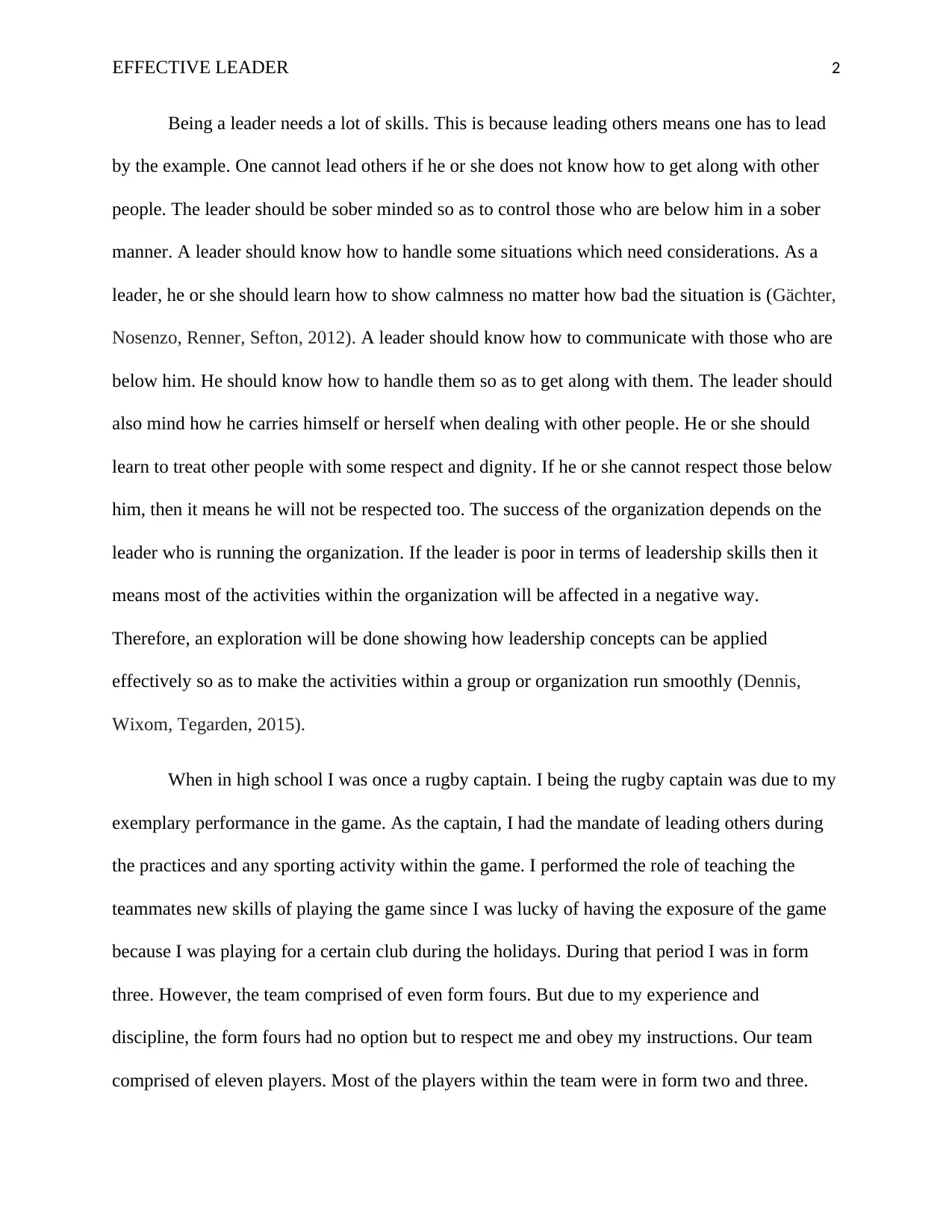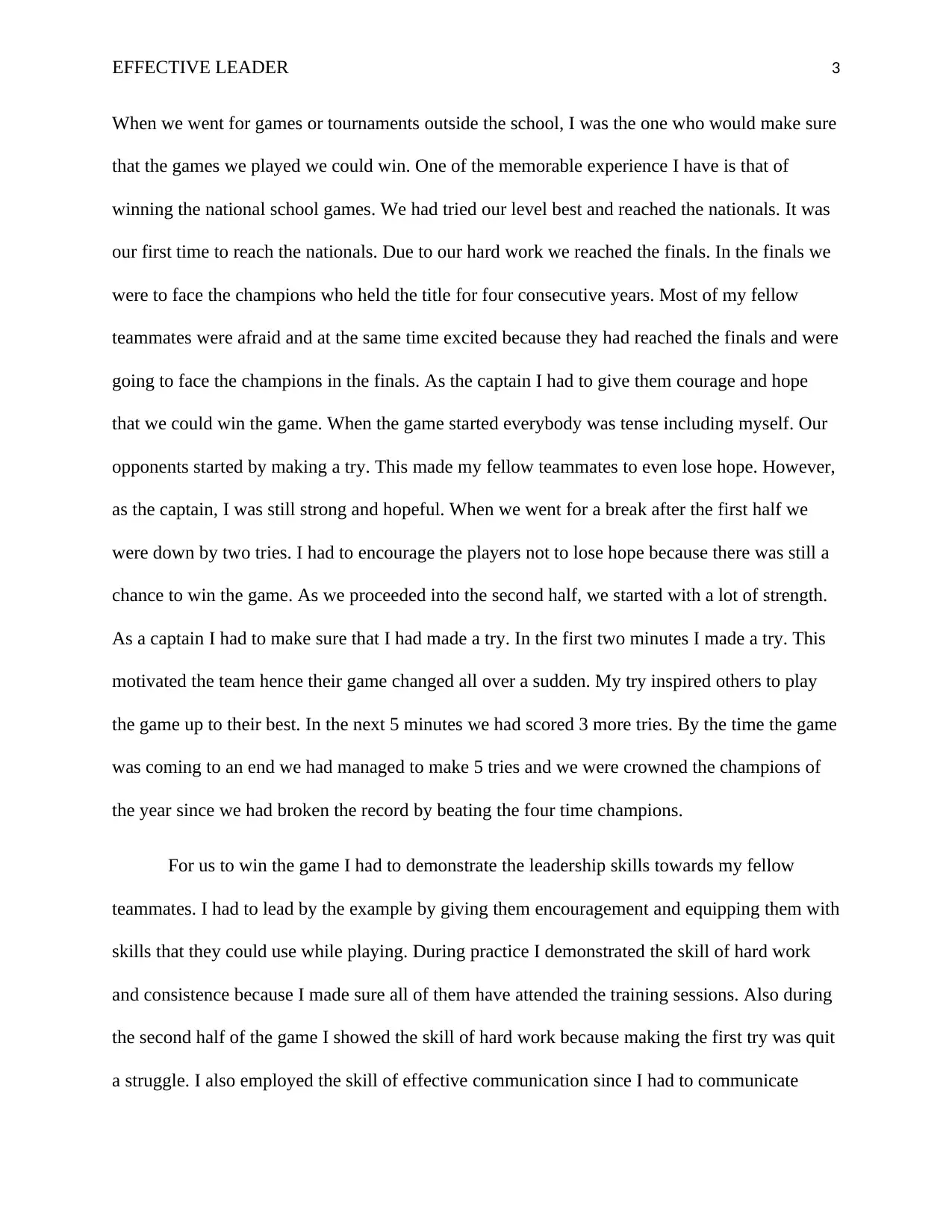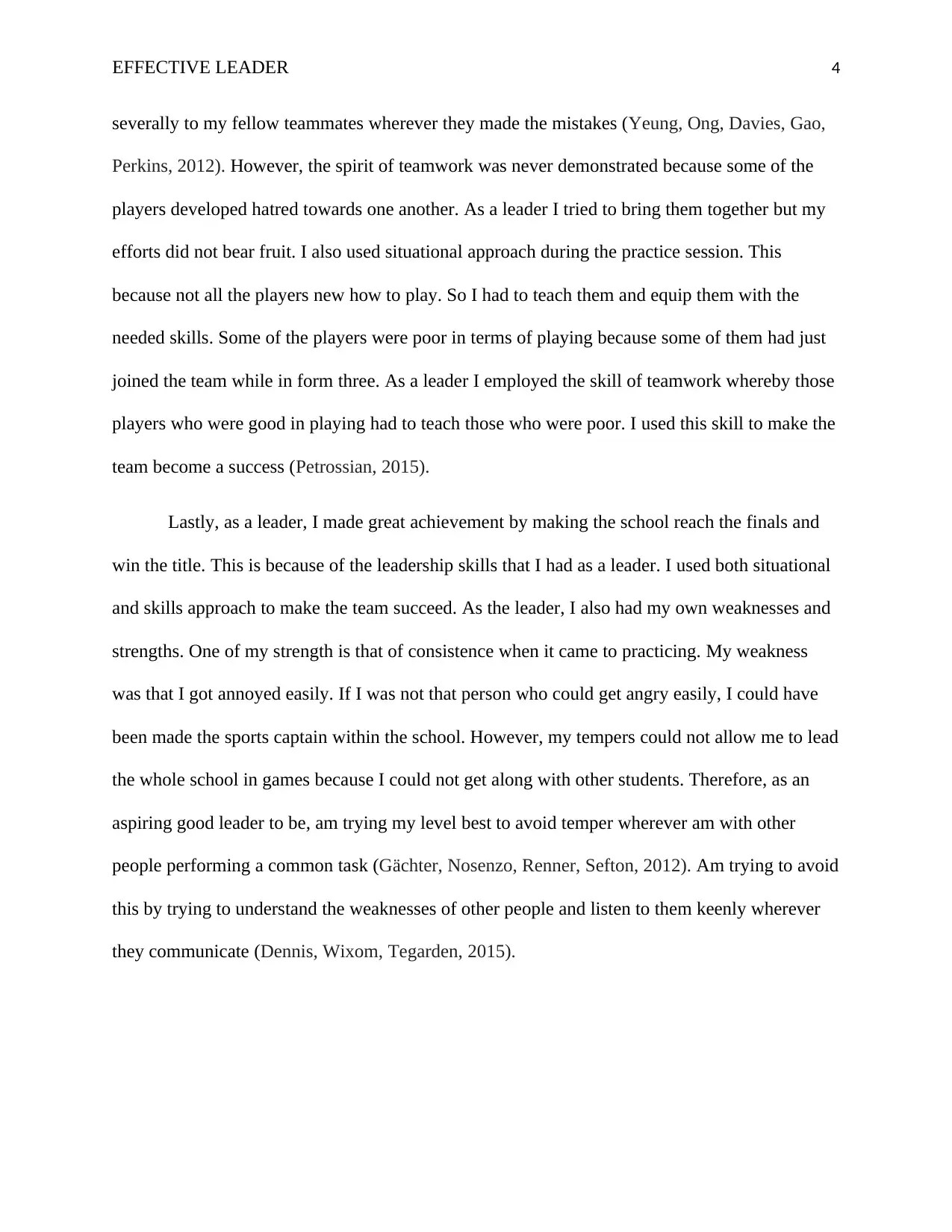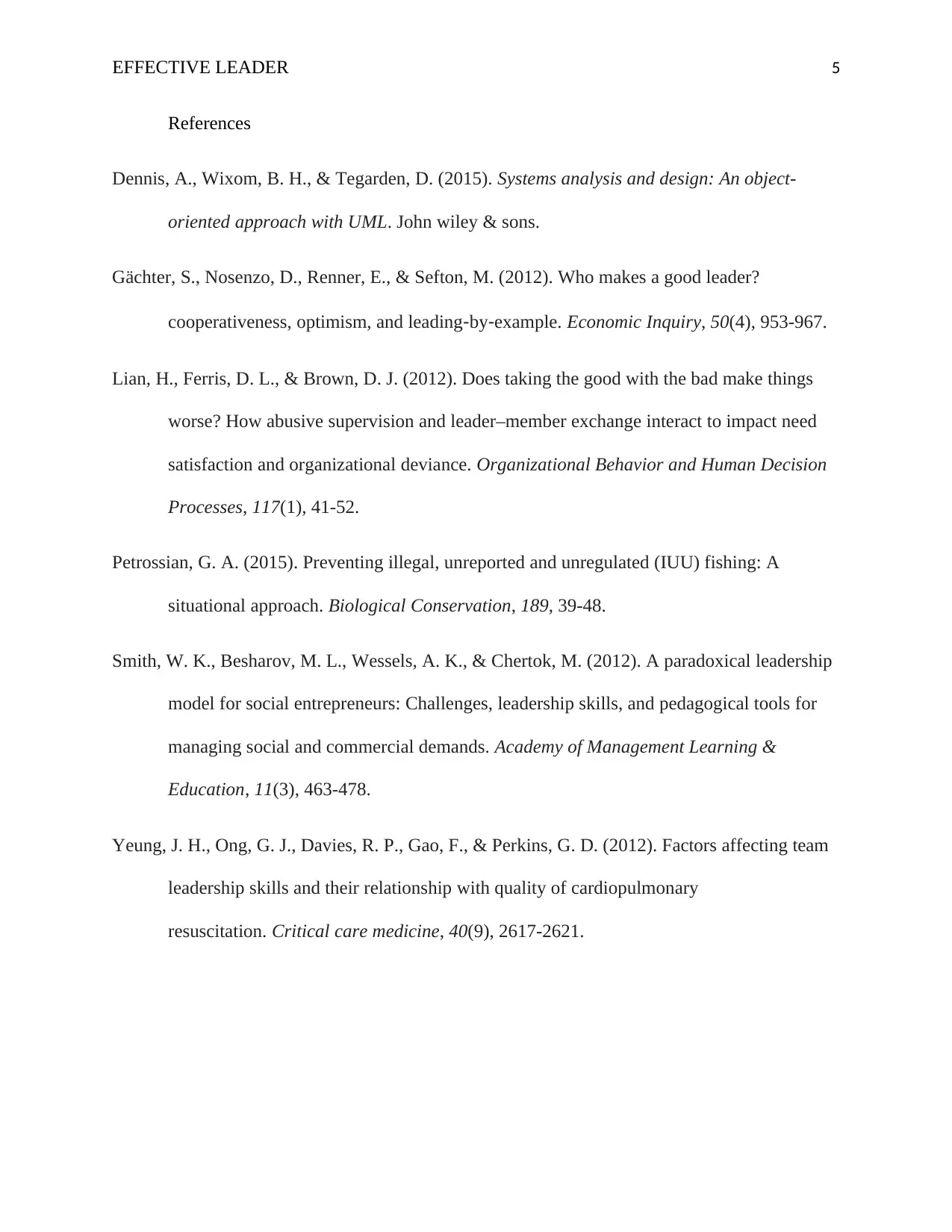Leadership Experience Paper: MGT 401 Business Leadership Report
VerifiedAdded on 2023/05/30
|5
|1537
|206
Report
AI Summary
This report delves into the multifaceted aspects of effective leadership, drawing upon the author's personal experiences as a rugby captain in high school. The paper explores key leadership skills, including leading by example, effective communication, and situational leadership, highlighting how these skills were instrumental in motivating teammates and achieving success. The author reflects on the challenges of teamwork and the importance of adapting leadership styles to different situations. The report also analyzes strengths and weaknesses in leadership, emphasizing the importance of self-awareness and continuous improvement in developing leadership capabilities. The author provides a detailed account of how these leadership skills were applied in a practical setting, such as a rugby game, and discusses the impact of these skills on team performance and achieving goals. The report also includes references to academic sources to support the analysis and provide a broader context for the leadership concepts discussed.

Running head: EFFECTIVE LEADER 1
Effective Leader
Institution’s Name:
Student’s Name:
Effective Leader
Institution’s Name:
Student’s Name:
Paraphrase This Document
Need a fresh take? Get an instant paraphrase of this document with our AI Paraphraser

EFFECTIVE LEADER 2
Being a leader needs a lot of skills. This is because leading others means one has to lead
by the example. One cannot lead others if he or she does not know how to get along with other
people. The leader should be sober minded so as to control those who are below him in a sober
manner. A leader should know how to handle some situations which need considerations. As a
leader, he or she should learn how to show calmness no matter how bad the situation is (Gächter,
Nosenzo, Renner, Sefton, 2012). A leader should know how to communicate with those who are
below him. He should know how to handle them so as to get along with them. The leader should
also mind how he carries himself or herself when dealing with other people. He or she should
learn to treat other people with some respect and dignity. If he or she cannot respect those below
him, then it means he will not be respected too. The success of the organization depends on the
leader who is running the organization. If the leader is poor in terms of leadership skills then it
means most of the activities within the organization will be affected in a negative way.
Therefore, an exploration will be done showing how leadership concepts can be applied
effectively so as to make the activities within a group or organization run smoothly (Dennis,
Wixom, Tegarden, 2015).
When in high school I was once a rugby captain. I being the rugby captain was due to my
exemplary performance in the game. As the captain, I had the mandate of leading others during
the practices and any sporting activity within the game. I performed the role of teaching the
teammates new skills of playing the game since I was lucky of having the exposure of the game
because I was playing for a certain club during the holidays. During that period I was in form
three. However, the team comprised of even form fours. But due to my experience and
discipline, the form fours had no option but to respect me and obey my instructions. Our team
comprised of eleven players. Most of the players within the team were in form two and three.
Being a leader needs a lot of skills. This is because leading others means one has to lead
by the example. One cannot lead others if he or she does not know how to get along with other
people. The leader should be sober minded so as to control those who are below him in a sober
manner. A leader should know how to handle some situations which need considerations. As a
leader, he or she should learn how to show calmness no matter how bad the situation is (Gächter,
Nosenzo, Renner, Sefton, 2012). A leader should know how to communicate with those who are
below him. He should know how to handle them so as to get along with them. The leader should
also mind how he carries himself or herself when dealing with other people. He or she should
learn to treat other people with some respect and dignity. If he or she cannot respect those below
him, then it means he will not be respected too. The success of the organization depends on the
leader who is running the organization. If the leader is poor in terms of leadership skills then it
means most of the activities within the organization will be affected in a negative way.
Therefore, an exploration will be done showing how leadership concepts can be applied
effectively so as to make the activities within a group or organization run smoothly (Dennis,
Wixom, Tegarden, 2015).
When in high school I was once a rugby captain. I being the rugby captain was due to my
exemplary performance in the game. As the captain, I had the mandate of leading others during
the practices and any sporting activity within the game. I performed the role of teaching the
teammates new skills of playing the game since I was lucky of having the exposure of the game
because I was playing for a certain club during the holidays. During that period I was in form
three. However, the team comprised of even form fours. But due to my experience and
discipline, the form fours had no option but to respect me and obey my instructions. Our team
comprised of eleven players. Most of the players within the team were in form two and three.

EFFECTIVE LEADER 3
When we went for games or tournaments outside the school, I was the one who would make sure
that the games we played we could win. One of the memorable experience I have is that of
winning the national school games. We had tried our level best and reached the nationals. It was
our first time to reach the nationals. Due to our hard work we reached the finals. In the finals we
were to face the champions who held the title for four consecutive years. Most of my fellow
teammates were afraid and at the same time excited because they had reached the finals and were
going to face the champions in the finals. As the captain I had to give them courage and hope
that we could win the game. When the game started everybody was tense including myself. Our
opponents started by making a try. This made my fellow teammates to even lose hope. However,
as the captain, I was still strong and hopeful. When we went for a break after the first half we
were down by two tries. I had to encourage the players not to lose hope because there was still a
chance to win the game. As we proceeded into the second half, we started with a lot of strength.
As a captain I had to make sure that I had made a try. In the first two minutes I made a try. This
motivated the team hence their game changed all over a sudden. My try inspired others to play
the game up to their best. In the next 5 minutes we had scored 3 more tries. By the time the game
was coming to an end we had managed to make 5 tries and we were crowned the champions of
the year since we had broken the record by beating the four time champions.
For us to win the game I had to demonstrate the leadership skills towards my fellow
teammates. I had to lead by the example by giving them encouragement and equipping them with
skills that they could use while playing. During practice I demonstrated the skill of hard work
and consistence because I made sure all of them have attended the training sessions. Also during
the second half of the game I showed the skill of hard work because making the first try was quit
a struggle. I also employed the skill of effective communication since I had to communicate
When we went for games or tournaments outside the school, I was the one who would make sure
that the games we played we could win. One of the memorable experience I have is that of
winning the national school games. We had tried our level best and reached the nationals. It was
our first time to reach the nationals. Due to our hard work we reached the finals. In the finals we
were to face the champions who held the title for four consecutive years. Most of my fellow
teammates were afraid and at the same time excited because they had reached the finals and were
going to face the champions in the finals. As the captain I had to give them courage and hope
that we could win the game. When the game started everybody was tense including myself. Our
opponents started by making a try. This made my fellow teammates to even lose hope. However,
as the captain, I was still strong and hopeful. When we went for a break after the first half we
were down by two tries. I had to encourage the players not to lose hope because there was still a
chance to win the game. As we proceeded into the second half, we started with a lot of strength.
As a captain I had to make sure that I had made a try. In the first two minutes I made a try. This
motivated the team hence their game changed all over a sudden. My try inspired others to play
the game up to their best. In the next 5 minutes we had scored 3 more tries. By the time the game
was coming to an end we had managed to make 5 tries and we were crowned the champions of
the year since we had broken the record by beating the four time champions.
For us to win the game I had to demonstrate the leadership skills towards my fellow
teammates. I had to lead by the example by giving them encouragement and equipping them with
skills that they could use while playing. During practice I demonstrated the skill of hard work
and consistence because I made sure all of them have attended the training sessions. Also during
the second half of the game I showed the skill of hard work because making the first try was quit
a struggle. I also employed the skill of effective communication since I had to communicate
⊘ This is a preview!⊘
Do you want full access?
Subscribe today to unlock all pages.

Trusted by 1+ million students worldwide

EFFECTIVE LEADER 4
severally to my fellow teammates wherever they made the mistakes (Yeung, Ong, Davies, Gao,
Perkins, 2012). However, the spirit of teamwork was never demonstrated because some of the
players developed hatred towards one another. As a leader I tried to bring them together but my
efforts did not bear fruit. I also used situational approach during the practice session. This
because not all the players new how to play. So I had to teach them and equip them with the
needed skills. Some of the players were poor in terms of playing because some of them had just
joined the team while in form three. As a leader I employed the skill of teamwork whereby those
players who were good in playing had to teach those who were poor. I used this skill to make the
team become a success (Petrossian, 2015).
Lastly, as a leader, I made great achievement by making the school reach the finals and
win the title. This is because of the leadership skills that I had as a leader. I used both situational
and skills approach to make the team succeed. As the leader, I also had my own weaknesses and
strengths. One of my strength is that of consistence when it came to practicing. My weakness
was that I got annoyed easily. If I was not that person who could get angry easily, I could have
been made the sports captain within the school. However, my tempers could not allow me to lead
the whole school in games because I could not get along with other students. Therefore, as an
aspiring good leader to be, am trying my level best to avoid temper wherever am with other
people performing a common task (Gächter, Nosenzo, Renner, Sefton, 2012). Am trying to avoid
this by trying to understand the weaknesses of other people and listen to them keenly wherever
they communicate (Dennis, Wixom, Tegarden, 2015).
severally to my fellow teammates wherever they made the mistakes (Yeung, Ong, Davies, Gao,
Perkins, 2012). However, the spirit of teamwork was never demonstrated because some of the
players developed hatred towards one another. As a leader I tried to bring them together but my
efforts did not bear fruit. I also used situational approach during the practice session. This
because not all the players new how to play. So I had to teach them and equip them with the
needed skills. Some of the players were poor in terms of playing because some of them had just
joined the team while in form three. As a leader I employed the skill of teamwork whereby those
players who were good in playing had to teach those who were poor. I used this skill to make the
team become a success (Petrossian, 2015).
Lastly, as a leader, I made great achievement by making the school reach the finals and
win the title. This is because of the leadership skills that I had as a leader. I used both situational
and skills approach to make the team succeed. As the leader, I also had my own weaknesses and
strengths. One of my strength is that of consistence when it came to practicing. My weakness
was that I got annoyed easily. If I was not that person who could get angry easily, I could have
been made the sports captain within the school. However, my tempers could not allow me to lead
the whole school in games because I could not get along with other students. Therefore, as an
aspiring good leader to be, am trying my level best to avoid temper wherever am with other
people performing a common task (Gächter, Nosenzo, Renner, Sefton, 2012). Am trying to avoid
this by trying to understand the weaknesses of other people and listen to them keenly wherever
they communicate (Dennis, Wixom, Tegarden, 2015).
Paraphrase This Document
Need a fresh take? Get an instant paraphrase of this document with our AI Paraphraser

EFFECTIVE LEADER 5
References
Dennis, A., Wixom, B. H., & Tegarden, D. (2015). Systems analysis and design: An object-
oriented approach with UML. John wiley & sons.
Gächter, S., Nosenzo, D., Renner, E., & Sefton, M. (2012). Who makes a good leader?
cooperativeness, optimism, and leading‐by‐example. Economic Inquiry, 50(4), 953-967.
Lian, H., Ferris, D. L., & Brown, D. J. (2012). Does taking the good with the bad make things
worse? How abusive supervision and leader–member exchange interact to impact need
satisfaction and organizational deviance. Organizational Behavior and Human Decision
Processes, 117(1), 41-52.
Petrossian, G. A. (2015). Preventing illegal, unreported and unregulated (IUU) fishing: A
situational approach. Biological Conservation, 189, 39-48.
Smith, W. K., Besharov, M. L., Wessels, A. K., & Chertok, M. (2012). A paradoxical leadership
model for social entrepreneurs: Challenges, leadership skills, and pedagogical tools for
managing social and commercial demands. Academy of Management Learning &
Education, 11(3), 463-478.
Yeung, J. H., Ong, G. J., Davies, R. P., Gao, F., & Perkins, G. D. (2012). Factors affecting team
leadership skills and their relationship with quality of cardiopulmonary
resuscitation. Critical care medicine, 40(9), 2617-2621.
References
Dennis, A., Wixom, B. H., & Tegarden, D. (2015). Systems analysis and design: An object-
oriented approach with UML. John wiley & sons.
Gächter, S., Nosenzo, D., Renner, E., & Sefton, M. (2012). Who makes a good leader?
cooperativeness, optimism, and leading‐by‐example. Economic Inquiry, 50(4), 953-967.
Lian, H., Ferris, D. L., & Brown, D. J. (2012). Does taking the good with the bad make things
worse? How abusive supervision and leader–member exchange interact to impact need
satisfaction and organizational deviance. Organizational Behavior and Human Decision
Processes, 117(1), 41-52.
Petrossian, G. A. (2015). Preventing illegal, unreported and unregulated (IUU) fishing: A
situational approach. Biological Conservation, 189, 39-48.
Smith, W. K., Besharov, M. L., Wessels, A. K., & Chertok, M. (2012). A paradoxical leadership
model for social entrepreneurs: Challenges, leadership skills, and pedagogical tools for
managing social and commercial demands. Academy of Management Learning &
Education, 11(3), 463-478.
Yeung, J. H., Ong, G. J., Davies, R. P., Gao, F., & Perkins, G. D. (2012). Factors affecting team
leadership skills and their relationship with quality of cardiopulmonary
resuscitation. Critical care medicine, 40(9), 2617-2621.
1 out of 5
Related Documents
Your All-in-One AI-Powered Toolkit for Academic Success.
+13062052269
info@desklib.com
Available 24*7 on WhatsApp / Email
![[object Object]](/_next/static/media/star-bottom.7253800d.svg)
Unlock your academic potential
Copyright © 2020–2026 A2Z Services. All Rights Reserved. Developed and managed by ZUCOL.




